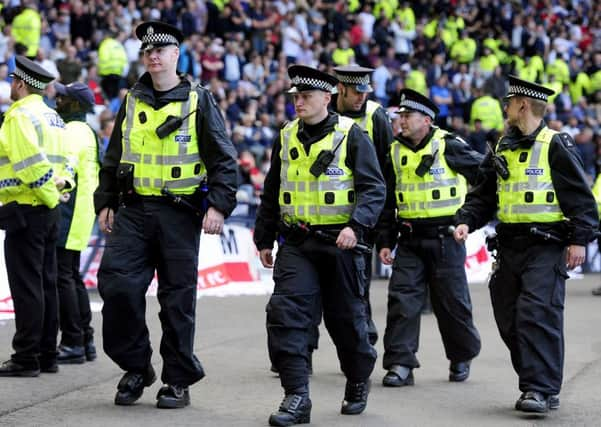Chris Marshall: Now not the time to cut frontline police numbers


When terrorists attacked London Bridge earlier this month, it took armed police just eight minutes from the time of the first emergency call to shoot dead all three attackers.
The response time following this week’s attack at Finsbury Park mosque was similarly impressive, with officers arriving within a minute and a cordon in place within ten.
Advertisement
Hide AdAdvertisement
Hide AdAnd such was the response to the blaze at Grenfell Tower, local residents lined the street to applaud firefighters after they had finished their work.
The professionalism of our police, firefighters and ambulance service is not in doubt, but it does come at a price.
Every crisis, every tragedy leads to days off being cancelled and shifts being extended.
At times when we need the emergency services the most, we are relying on their goodwill to get the job done.
Since 2010 when Theresa May was appointed home secretary, the number of police officers in England and Wales has fallen by around 19,000, or 13 per cent.
Police Scotland has been protected from similar cuts by a 2007 SNP manifesto pledge to maintain 1,000 extra officers above the level they inherited on coming to power.
But while officer numbers have remained static, huge numbers of support staff have left the organisation, leading to frontline police being reshuffled into office jobs.
And while SNP ministers have been happy to highlight the policy, senior police officers have privately expressed frustration over the difficulties it has caused in managing their budget.
Advertisement
Hide AdAdvertisement
Hide AdYesterday, however, justice secretary Michael Matheson confirmed Chief Constable Phil Gormley will be able to “slow” recruitment as part of a new ten-year strategy.
Following the publication of the draft strategy earlier this year, Police Scotland and the Scottish Police Authority said there would be an overall reduction of 400 officers by the end of 2020.
While the handing of more autonomy to Police Scotland to allow it to make its own decisions is to be welcomed, now seems like the wrong time to be cutting officer numbers.
Since the publication of the Policing 2026 strategy in February, the security situation has undoubtedly changed.
It’s perhaps too early to say whether attacks like those in Manchester and London will become the new normal, a prospect almost to terrible to comprehend.
But whether that’s the case or not, we need more frontline officers, not fewer.
In that respect the Police Scotland strategy already feels outdated.
Nor is this simply about terrorism.
Statistics from Police Scotland show violent crime, including murder, serious assault and robbery are on the rise.
Advertisement
Hide AdAdvertisement
Hide AdThere may be new and emerging crime threats to face in the future, and Scotland could be a very different place by 2026.
But there are challenges, some of them deadly, in the here and now.
Police Scotland may now have more control over how it shapes is destiny, but senior officers should think carefully before cutting back on a frontline paid to keep us safe in a world which feels increasingly dangerous.